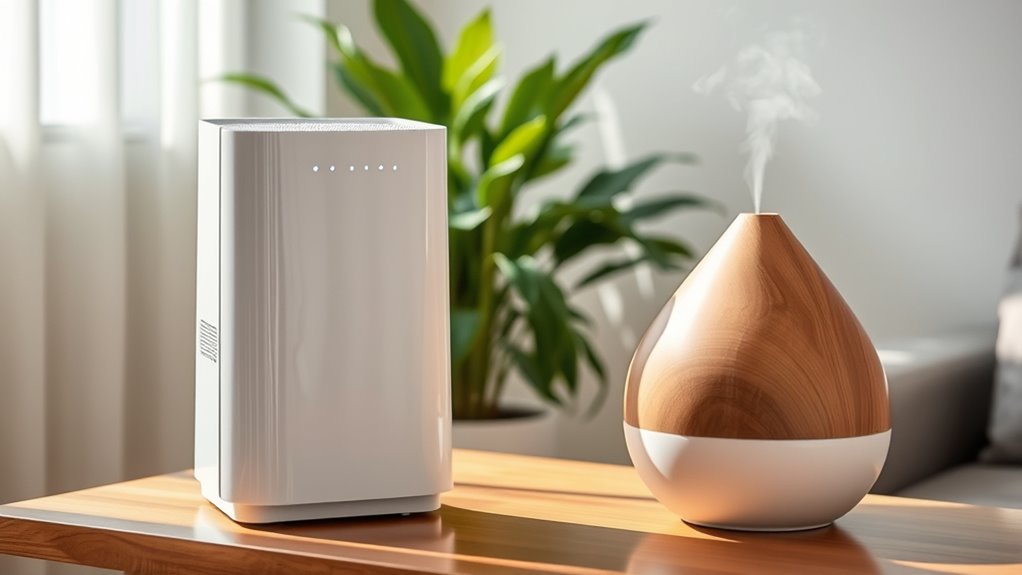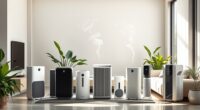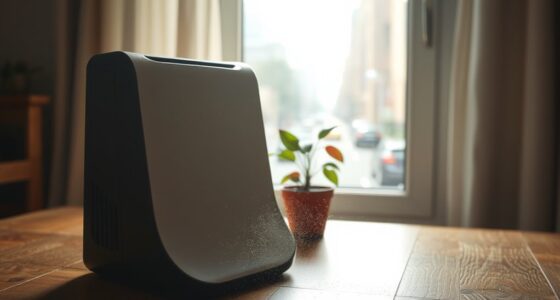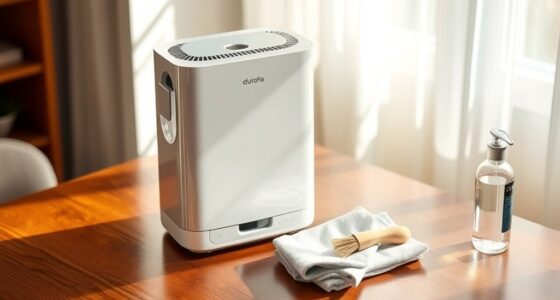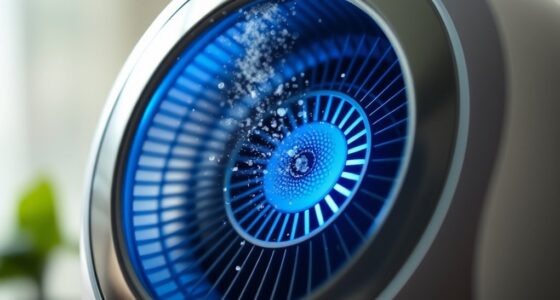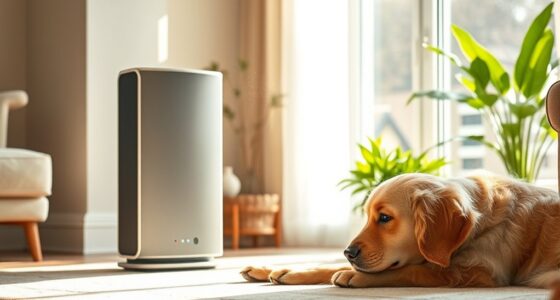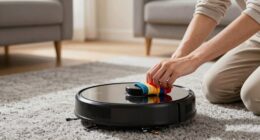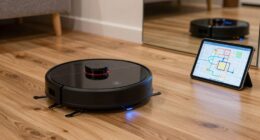Air purifiers and humidifiers serve different purposes for your indoor air quality. Air purifiers filter out allergens and pollutants, improving the air you breathe. In contrast, humidifiers add moisture to combat dryness, which can help alleviate respiratory issues and skin discomfort. Understanding these differences can help you choose the right device for your needs. If you’re looking to learn how to select the best option for your environment, there’s more to explore on this topic.
Key Takeaways
- Air purifiers filter out airborne pollutants, while humidifiers add moisture to the air for improved humidity levels.
- Air purifiers are ideal for allergy sufferers, whereas humidifiers relieve dry skin and respiratory discomfort.
- Air purifiers enhance air quality by removing allergens, while humidifiers maintain humidity to prevent dryness and support respiratory health.
- Regular maintenance is crucial for both devices to ensure optimal performance and health benefits.
- Combined devices that incorporate both air purification and humidification can provide comprehensive improvements to indoor air quality.

LEVOIT Air Purifier for Home Allergens Pet Hair in Bedroom, Covers Up to 1073 ft² by 56W High Torque Motor, AHAM VERIFIDE, 3-in-1 Filter with HEPA Sleep Mode, Remove Dust Smoke Odor, Core300-P, White
WHY CHOOSE AHAM VERIFIDE AIR PURIFIERS: AHAM (Association of Home Appliance Manufacturers) is an ANSI-accredited organization that sets…
As an affiliate, we earn on qualifying purchases.
As an affiliate, we earn on qualifying purchases.
What Is an Air Purifier?
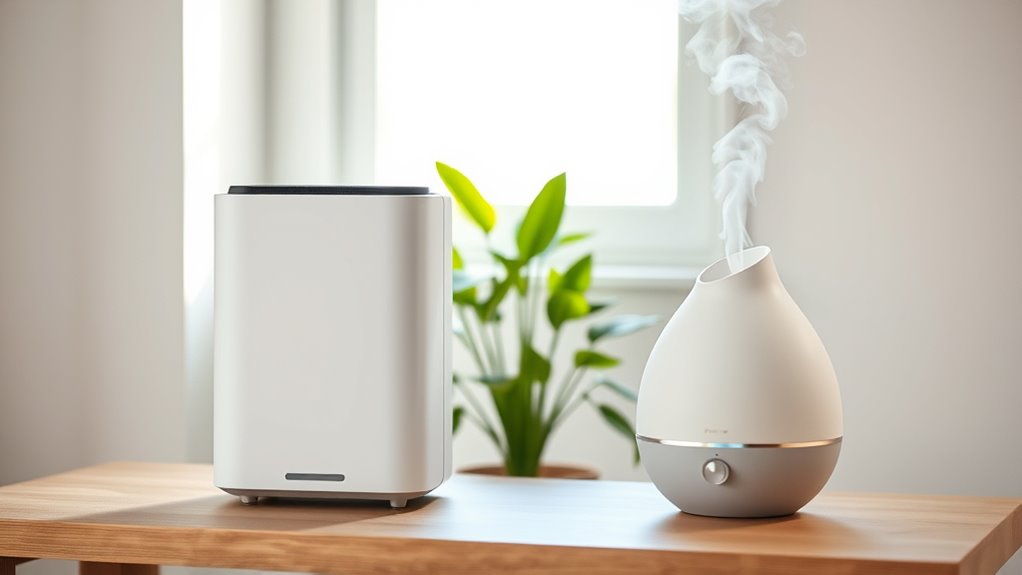
An air purifier is your ally in battling indoor air pollution. It’s designed to improve air quality by capturing airborne contaminants like dust, pollen, smoke, and viruses through an efficient filtration system.
Most air purifiers use HEPA filters that can remove up to 99.95% of particles as small as 0.1 microns, making them highly effective against allergens and pollutants. To maintain the effectiveness of your device, it’s essential to regularly check and clean filters to ensure optimal performance. Air purifiers are particularly beneficial for allergy sufferers and homes with pets, providing relief from symptoms and reducing odors. Additionally, these devices can help enhance indoor air quality by filtering and circulating air, which is essential for maintaining a healthy living environment. Regular maintenance and cleaning is crucial to prevent costly repairs and ensure long-lasting performance.
The main components include a fan to draw in air and a series of filters, which may consist of pre-filters and activated carbon, in addition to HEPA filters. Additionally, many models feature smart WiFi connectivity for remote operation and hands-free usage.

Frida Baby 3-in-1 Cool Mist Humidifier for Large Rooms, Top Fill Humidifier for Bedroom, Allergy Relief, 60 Hour Runtime + Nightlight, Auto Shut-Off, Quiet, Carry Handle, Essential Oil Diffuser
ULTRASONIC COOL MIST HUMIDIFIER: Our baby humidifier converts water into a refreshing mist that runs up to 60…
As an affiliate, we earn on qualifying purchases.
As an affiliate, we earn on qualifying purchases.
Types of Air Purifiers
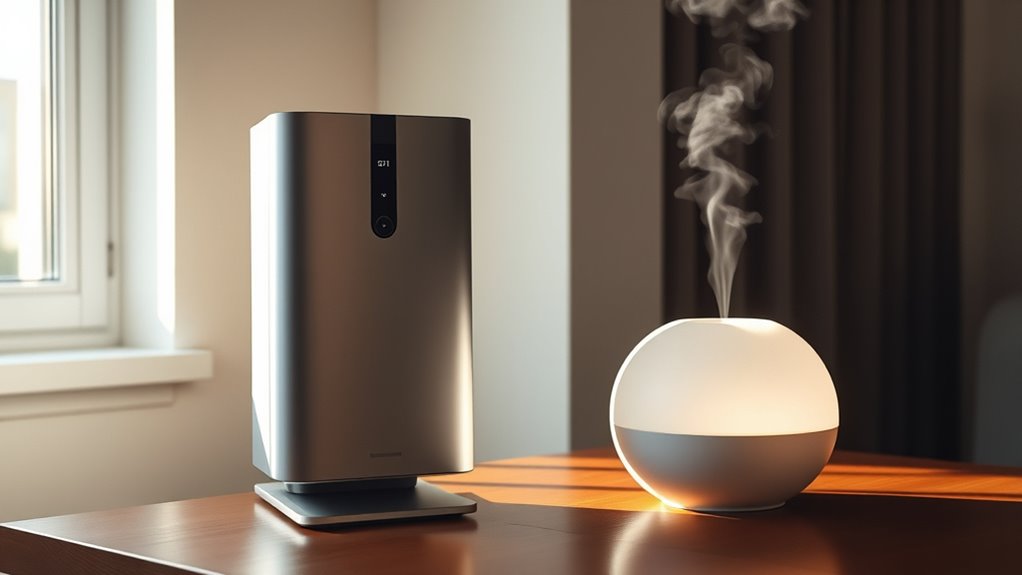
Air purifiers come in various types, each designed to meet specific needs and environments.
Portable air purifiers are perfect for small to medium-sized rooms, effectively filtering allergens and pollutants to improve indoor air quality. They often feature easy cleanup options that minimize maintenance efforts and typically include HEPA filtration for optimal allergen removal. Many portable models also come equipped with smart features that allow for app control and scheduling.
For larger spaces, whole-house air purifiers integrate with your HVAC system, ensuring continuous air purification throughout the building.
Central air purifiers, installed within ductwork, are ideal for large office environments, circulating purified air effectively.
HEPA air purifiers utilize advanced filtration technology to capture 99.95% of airborne particles down to 0.1 microns, making them highly effective against allergens.
Finally, UV-C light air purifiers enhance the air purification process by using ultraviolet light to eliminate bacteria and viruses, further boosting your air quality. Additionally, hybrid/combination units provide multiple filtration methods for improved effectiveness and versatility in air purification.

GermGuardian HEPA Air Purifier for Home, Large Rooms – 743 Sq. Ft. with HEPA Air Filter, UV-C Light & Odor Reduction, AC4825E, 22" Tower, Gray
TRUE HEPA 3-LAYER PROTECTION: HEPA filter captures 99.97% of smoke, dust, pollen, and pet dander as small as…
As an affiliate, we earn on qualifying purchases.
As an affiliate, we earn on qualifying purchases.
What Is a Humidifier?
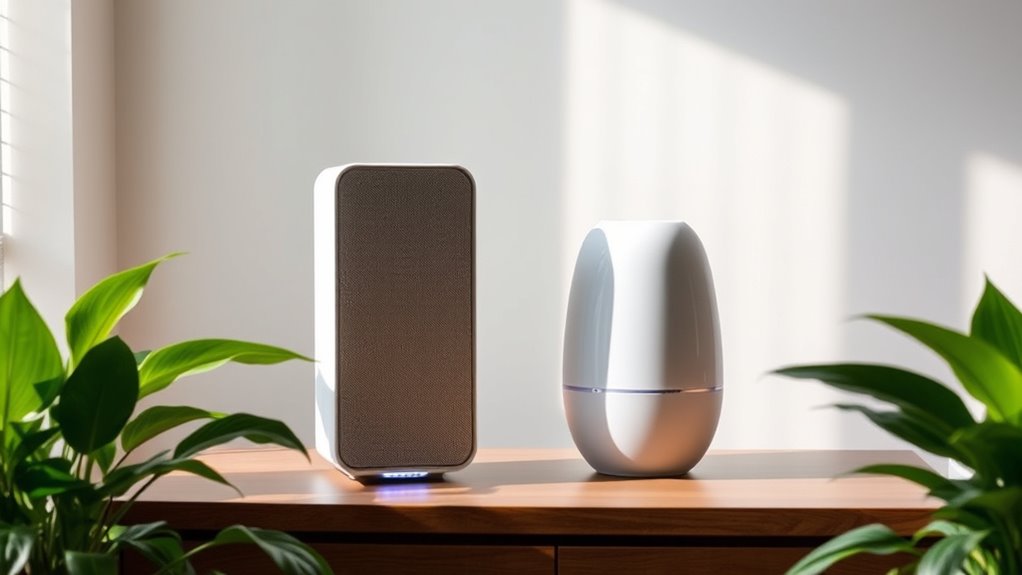
A humidifier adds moisture to the air, helping you maintain ideal humidity levels between 30% and 50%. By doing so, it can relieve discomfort from dry skin, scratchy throats, and respiratory issues. Understanding how a humidifier works and its health benefits can enhance your indoor environment considerably. Additionally, maintaining optimal humidity levels can also improve air quality, which is essential for respiratory health. Furthermore, using a humidifier can contribute to optimal humidity levels, ensuring a comfortable living space that promotes overall well-being. Incorporating a humidifier into your home can create a nurturing atmosphere that supports emotional well-being for the entire family. Moreover, maintaining proper humidity can help mitigate the harmful effects of wood smoke exposure, which is crucial for protecting respiratory health. It’s also beneficial to ensure that the humidifier is regularly cleaned to prevent the growth of mold and bacteria, which can negatively impact air quality.
Humidifier Functionality Explained
Humidifiers serve as essential devices for adding moisture to dry air, especially during winter months or in arid climates. By emitting water vapor, they help maintain the ideal humidity level between 30% and 50%. This can alleviate issues like dry skin, scratchy throats, and respiratory discomfort. Additionally, using a humidifier can enhance user experience by creating a more comfortable indoor environment. Regular home cleaning practices can also contribute to improved air quality and comfort. Proper humidity levels can also help reduce household energy consumption by making it feel warmer in the winter. Humidifiers can also support respiratory health by creating a more favorable environment for breathing.
There are several types of humidifiers, including cool mist, warm mist, and ultrasonic.
Regular maintenance is vital to prevent mold growth and guarantee effective operation. Humidifiers don’t clean the air or remove allergens but can provide indirect support for respiratory health. Heated mattress pads can also enhance comfort during dry seasons by helping to maintain a cozy sleeping environment.
Keeping your humidifier clean and refilling water tanks regularly optimizes performance and comfort. Investing in a humidifier can greatly enhance your indoor air quality during dry conditions.
Health Benefits of Humidifiers
Adding moisture to your indoor environment comes with a range of health benefits that can greatly improve your quality of life.
Humidifiers maintain ideal humidity levels between 30% and 50%, helping to alleviate dry skin and respiratory issues. By increasing moisture in the air, they can also reduce the spread of germs during cold and flu seasons. Additionally, maintaining optimal humidity can enhance emotional resilience, aiding in coping with challenges during seasonal changes.
If you suffer from allergies or asthma, using a humidifier can help prevent the drying of your nasal passages and throat, though keep in mind they don’t remove allergens from the air.
Regular maintenance is essential; improperly cleaned humidifiers can develop mold and introduce pollutants back into your home, negating their health benefits. Additionally, creating a comfortable indoor environment with enhanced air quality can further support overall well-being for seniors.
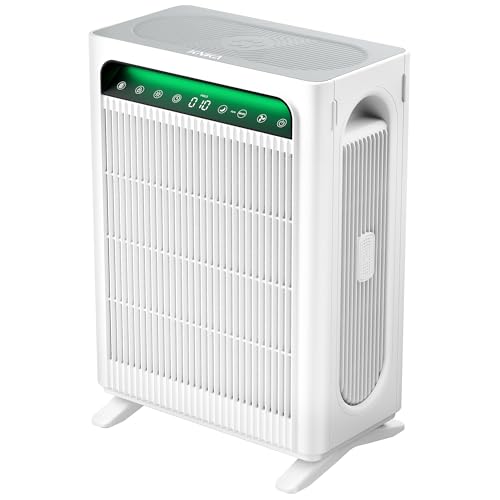
KNKA Air Purifier for Home Bedroom Large Room Up to 1,695 Ft² Once Per Hour, HEPA Air Cleaner with Washable Pre-Filter, AHAM VERIFIDE, AQI Display, ECO Mode, Pet Mode for Pets, Dust, Pollen, APH4000
𝐀𝐇𝐀𝐌 𝐕𝐞𝐫𝐢𝐟𝐢𝐞𝐝 & 𝐇𝐢𝐠𝐡 𝐂𝐀𝐃𝐑 𝐕𝐚𝐥𝐮𝐞: Certified by the Association of Home Appliance Manufacturers, this air purifier provides…
As an affiliate, we earn on qualifying purchases.
As an affiliate, we earn on qualifying purchases.
Types of Humidifiers
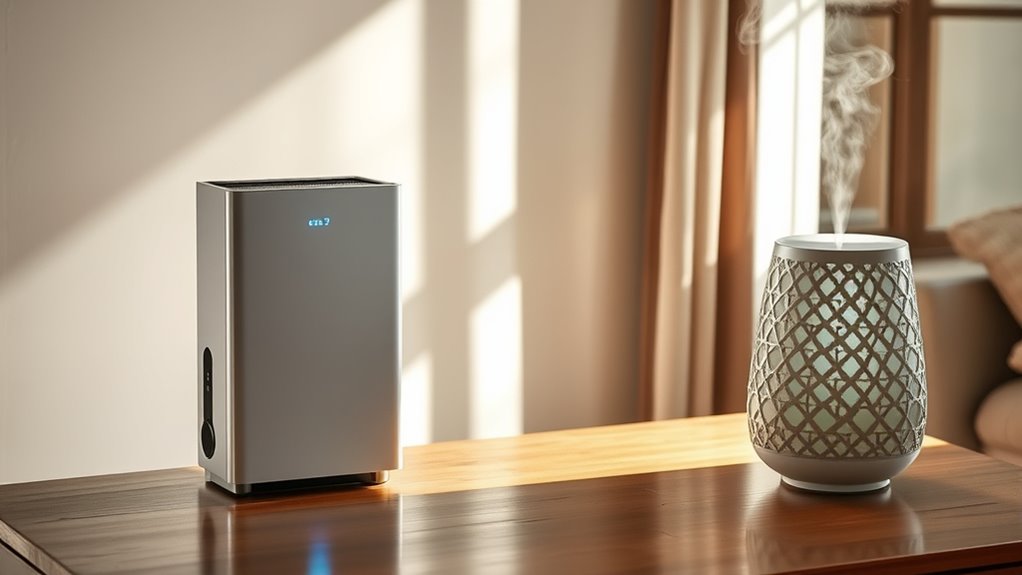
When choosing a humidifier, it’s important to understand the different types available.
Each type, from cool mist to steam vaporizers, offers unique benefits tailored to your needs.
Types of Humidifiers
There are several types of humidifiers, each designed to meet specific needs and preferences. Understanding these options can help you choose the right one for your environment:
- Cool Mist Humidifiers: Release a cool mist, ideal for alleviating allergy symptoms and respiratory issues.
- Warm Mist Humidifiers: Emit warm steam, soothing coughs and colds, but may raise room temperature.
- Ultrasonic Humidifiers: Utilize high-frequency sound waves, making them energy-efficient and quieter.
- Evaporative Humidifiers: Use a fan to blow air through a wet wick, naturally regulating humidity levels.
Steam vaporizers heat water to produce steam, providing relief from cold symptoms, but require care due to hot surfaces.
Choose the type that best fits your needs for maximum comfort.
Humidifier Benefits and Uses
Humidifiers play an essential role in enhancing indoor air quality, especially in dry environments. They add moisture to the air, helping to alleviate dry skin, scratchy throats, and respiratory discomfort.
With the ideal humidity level between 30% and 50%, you can reduce the spread of germs and viruses, making your home healthier. There are various types of humidifiers, like cool mist, warm mist, and ultrasonic, each catering to your specific needs.
Regular maintenance, including refilling the water tank and cleaning components, is vital to prevent mold growth and guarantee peak performance.
Ultrasonic humidifiers create a fine mist, effectively improving skin hydration and providing relief from dry air’s effects. Enjoy the numerous humidifier benefits for a more comfortable living space!
The Difference Between an Air Purifier and a Humidifier
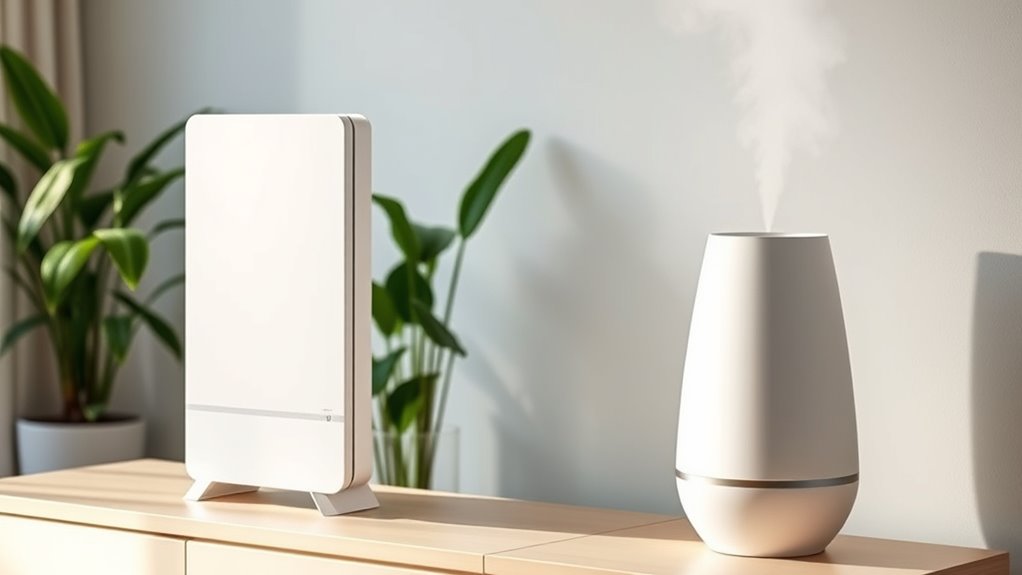
Although both air purifiers and humidifiers play essential roles in maintaining a comfortable indoor environment, they serve very different purposes.
An air purifier focuses on removing pollutants, utilizing advanced filtration technology like HEPA filters to capture allergens such as dust and pollen.
An air purifier targets pollutants, using HEPA filters to effectively trap allergens like dust and pollen.
In contrast, a humidifier is all about adding moisture to the air, helping to maintain ideal humidity levels between 30% and 50%.
- Air purifiers improve indoor air quality by filtering out harmful particles.
- Humidifiers alleviate dryness, which can reduce respiratory symptoms.
- Air purifiers don’t affect humidity levels, while humidifiers can create a more comfortable atmosphere.
- Using both devices together can enhance overall air quality when placed at a safe distance.
How Do Air Purifiers and Humidifiers Affect Your Health?
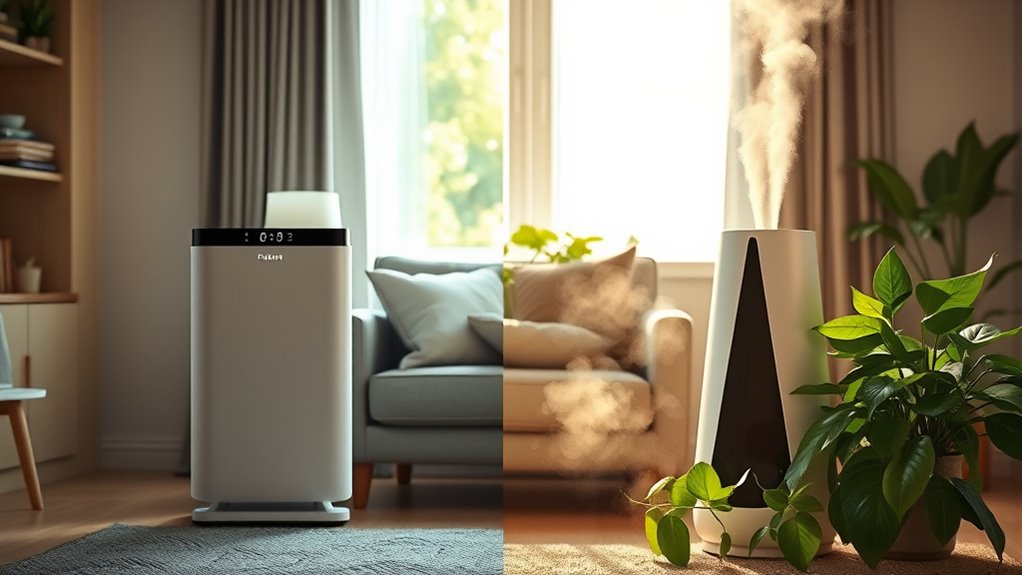
Understanding how air purifiers and humidifiers impact your health can guide you in creating a more comfortable living space.
Air purifiers are effective at removing airborne particles, such as dust mites and pet dander, which helps improve air quality and reduce allergens that can trigger allergy symptoms.
On the other hand, humidifiers add moisture in the air, relieving respiratory health issues related to dry conditions, like throat irritation. Maintaining ideal humidity levels of 30-50% can also reduce the infectiousness of viruses.
However, be cautious—improperly maintained humidifiers might introduce mold spores, worsening air quality.
Combining both devices can effectively address different health concerns, enhancing your overall well-being by improving air quality and maintaining healthy humidity levels.
When to Use a Humidifier and When to Use an Air Purifier
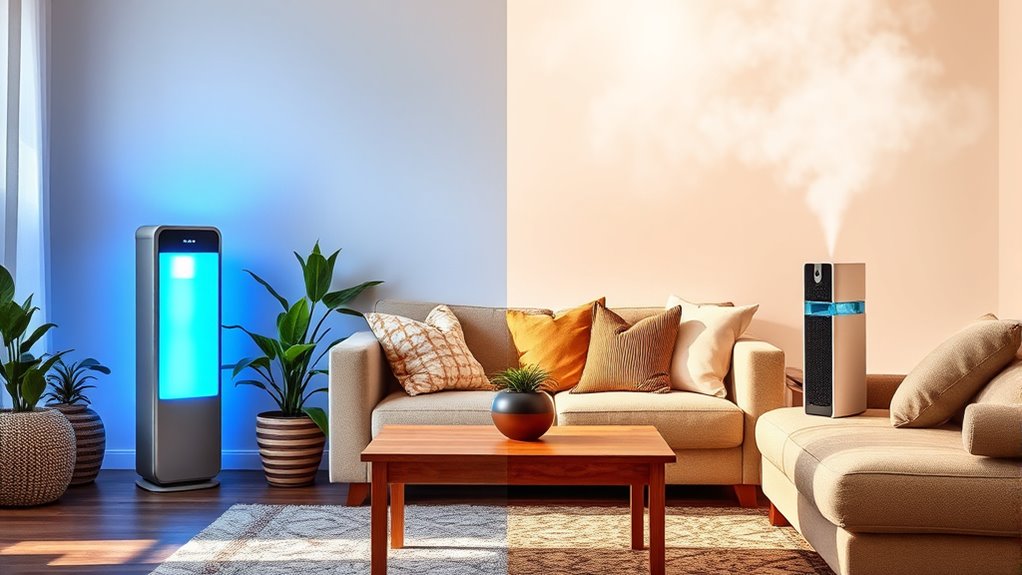
Knowing when to use a humidifier or an air purifier can make a significant difference in your comfort and well-being.
- Use a humidifier in dry conditions or winter months when indoor humidity drops below 30-50%.
- Turn on an air purifier year-round in spaces with high allergens, pollutants, or smoke.
- Humidifiers alleviate symptoms of dry air, while air purifiers improve air quality by filtering out allergens.
- Be cautious of mold growth; maintain proper humidity levels when using both devices.
If you struggle with asthma or respiratory discomfort, an air purifier is essential for reducing exposure to triggers like dust mites.
Conversely, a humidifier can help ease the irritation caused by dry air.
Air Purifier and Humidifier in One
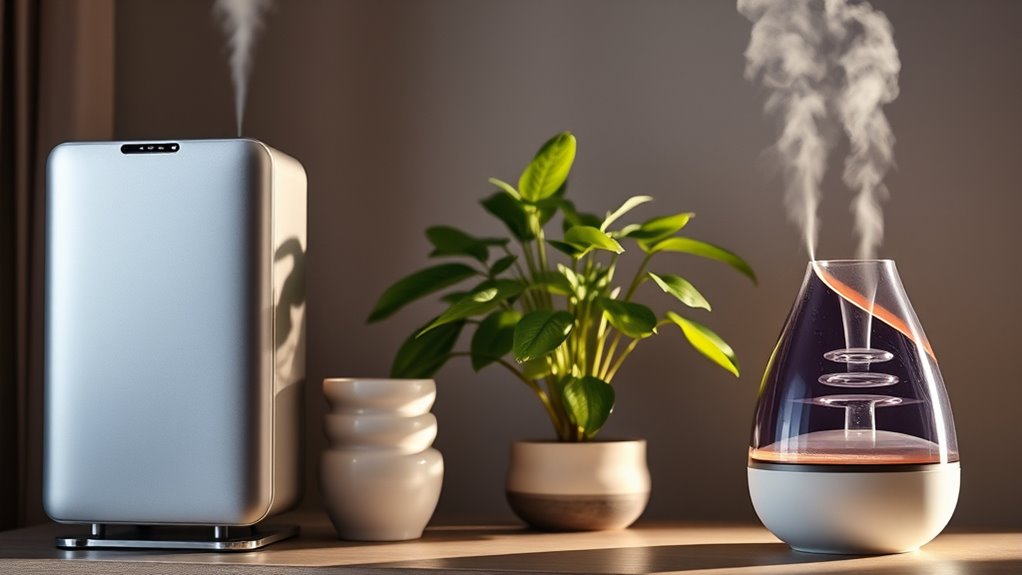
If you’re looking for a convenient solution to improve your indoor air quality, a combined air purifier and humidifier might be just what you need.
These combined devices address both dryness and pollution in indoor environments, making them ideal for maintaining optimal humidity levels. Utilizing advanced HEPA filtration technology, they capture up to 99.95% of airborne particles as small as 0.1 microns, enhancing your air quality considerably.
This is especially beneficial for allergy and asthma sufferers. Plus, using an air purifier and humidifier together helps reduce maintenance hassle, requiring fewer filter changes and water refills.
Whether you’re dealing with dry climates or winter heating, these integrated systems work effectively to create a more comfortable living space.
How to Choose the Right Air Purifier or Humidifier for Your Needs
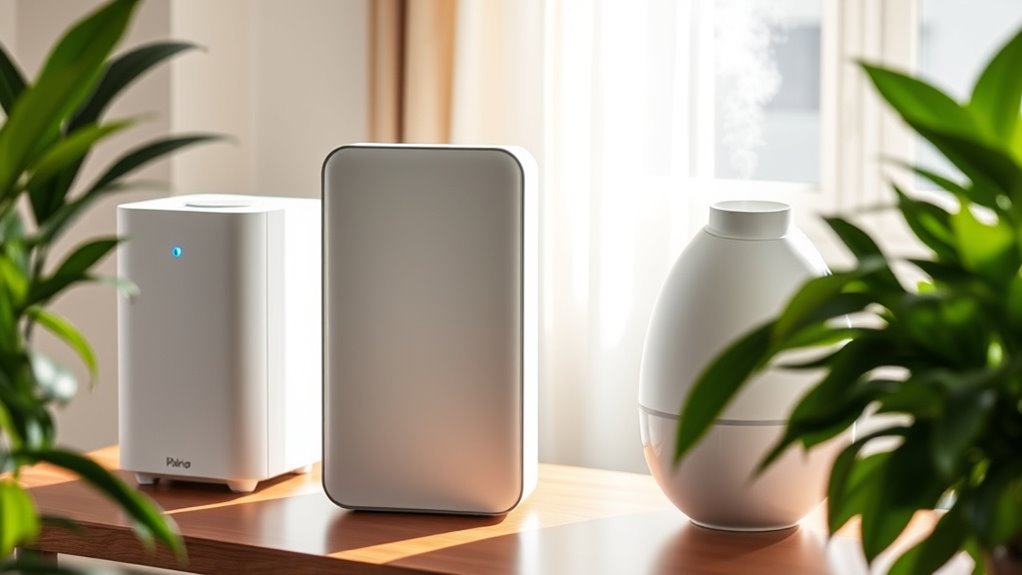
How do you determine the best air purifier or humidifier for your specific needs? Start by evaluating your environment and health requirements.
- For allergies or asthma, choose air purifiers with HEPA filters to remove airborne particles effectively.
- If you live in a dry climate, a humidifier can improve the air quality and provide humidity control.
- Consider maintenance: air purifiers need filter replacements, while humidifiers must be properly cleaned to avoid mold growth.
- If you want both benefits, look for combined devices that include air purification and humidification functions.
Frequently Asked Questions
Is It Better to Have an Air Purifier or Humidifier?
When deciding whether to get an air purifier or a humidifier, it really depends on your needs.
If you’re dealing with allergies or respiratory issues, an air purifier might be your best bet since it removes airborne pollutants.
On the other hand, if dry air is causing discomfort, a humidifier can add moisture, easing irritation.
Consider your environment and symptoms to determine which device would improve your indoor air quality the most.
What Are the Disadvantages of an Air Purifier?
Using an air purifier can feel like trying to catch smoke with your bare hands—it’s tricky.
You’ve got to deal with regular maintenance and costs for filter replacements. Some models might even emit ozone, which isn’t great for your lungs, especially if you have asthma.
If you’ve got a large space, a small unit won’t do much good, and you’ll miss out on addressing dry air issues altogether.
Plus, some can be pretty noisy!
How Do I Know if I Need an Air Purifier or Dehumidifier?
To determine if you need an air purifier or a dehumidifier, assess your indoor air quality and comfort.
If you’re struggling with allergens like dust or smoke, an air purifier’s your best bet.
On the other hand, if you notice excessive moisture causing mold or mildew, a dehumidifier will help.
Pay attention to symptoms, humidity levels, and the specific issues you face, so you can choose the right solution for your home.
Is a Humidifier or Purifier Better for a Stuffy Nose?
When it comes to a stuffy nose, you might’ve heard that “sometimes less is more.”
A humidifier can help by adding moisture to the air, easing dryness in your nasal passages and reducing congestion.
However, if allergens are the culprit behind your stuffiness, an air purifier can clear the air of irritants.
For the best results, consider using both to tackle dryness and allergens effectively, ensuring you breathe easier.
Conclusion
In conclusion, selecting the right device for your space is essential. Whether you opt for an air purifier or a humidifier, understanding their unique uses and benefits will help you breathe better and feel fresher. Remember, purifiers provide clean, clear air, while humidifiers add moisture for comfort. Make mindful choices to enhance your environment and improve your health. With the right tools, you’ll create a cozy, calming atmosphere that promotes well-being and wellness!
